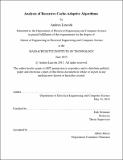| dc.contributor.advisor | Erik Demaine. | en_US |
| dc.contributor.author | Lincoln, Andrea (Andrea I.) | en_US |
| dc.contributor.other | Massachusetts Institute of Technology. Department of Electrical Engineering and Computer Science. | en_US |
| dc.date.accessioned | 2016-01-04T20:00:21Z | |
| dc.date.available | 2016-01-04T20:00:21Z | |
| dc.date.copyright | 2015 | en_US |
| dc.date.issued | 2015 | en_US |
| dc.identifier.uri | http://hdl.handle.net/1721.1/100630 | |
| dc.description | Thesis: M. Eng., Massachusetts Institute of Technology, Department of Electrical Engineering and Computer Science, 2015. | en_US |
| dc.description | This electronic version was submitted by the student author. The certified thesis is available in the Institute Archives and Special Collections. | en_US |
| dc.description | Title as it appears in MIT Commencement Exercises program, June 5, 2015: Advances in cache analysis for algorithms. Cataloged from student-submitted PDF version of thesis. | en_US |
| dc.description | Includes bibliographical references (pages 33-34). | en_US |
| dc.description.abstract | The performance and behavior of caches is becoming increasingly important to the overall performance of systems. As a result, there has been extensive study of caching in theoretical computer science. The traditionally studied model was the external-memory model [AV88]. In this model cache misses cost O(1) and operations on the CPU are free [AV88]. In 1999 Frigo, Leiserson, Prokop and Ramachandran proposed the cache-oblivious model [FLPR99]. In this model algorithms don't have access to cache information, like the size of the cache. However, neither model captures the fact that an algorithm's available cache can change over time, which can effect its efficiency. In 2014, the cache-adaptive model was proposed [BEF+14]. The cache-adaptive model is a model where the cache can change in size when a cache miss occurs [BEF+14]. In more recent work, to be published, methods for analysis in the cache-adaptive context are proposed [MABM]. In this thesis we analyze the efficiency of recursive algorithms in the cache-adaptive model. Specifically, we present lower bounds on progress per cache miss and upper bounds on the total number of cache misses in an execution. The algorithms we analyze are divide and conquer algorithms that follow the recurrence T(N) = aT (N=b) + Nc. For divide and conquer algorithms of this form, there is a method for calculating within a constant factor the number of cache misses incurred. This provides a theorem analogues to the Master Theorem, but applicable to the cache-adaptive model. | en_US |
| dc.description.statementofresponsibility | by Andrea Lincoln. | en_US |
| dc.format.extent | 34 pages | en_US |
| dc.language.iso | eng | en_US |
| dc.publisher | Massachusetts Institute of Technology | en_US |
| dc.rights | M.I.T. theses are protected by copyright. They may be viewed from this source for any purpose, but reproduction or distribution in any format is prohibited without written permission. See provided URL for inquiries about permission. | en_US |
| dc.rights.uri | http://dspace.mit.edu/handle/1721.1/7582 | en_US |
| dc.subject | Electrical Engineering and Computer Science. | en_US |
| dc.title | Analysis of recursive cache-adaptive algorithms | en_US |
| dc.title.alternative | Advances in cache analysis for algorithms | en_US |
| dc.type | Thesis | en_US |
| dc.description.degree | M. Eng. | en_US |
| dc.contributor.department | Massachusetts Institute of Technology. Department of Electrical Engineering and Computer Science | |
| dc.identifier.oclc | 933227456 | en_US |
